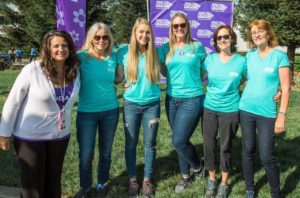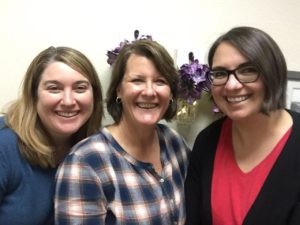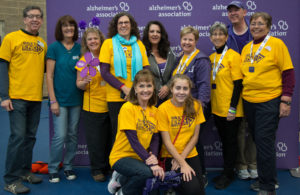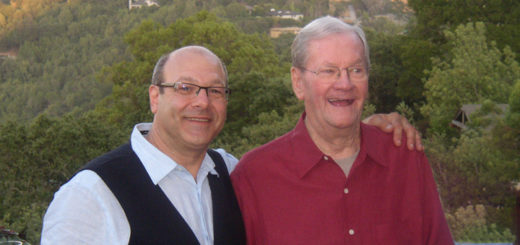Supporting families, and each other, in times of disaster
Atlas. Camp. Carr. Ferguson. Nuns. Mendocino Complex. Redwood Valley Complex. Tubbs. These are some of the large fires that have devastated our region in the past 18 months.
Daily life for those with Alzheimer’s disease and their care partners can be challenging, even before a disaster strikes. Staff from our Chico and Santa Rosa offices recently discussed how the Alzheimer’s Association has supported families who were impacted by the fires.
Where is my mom?
When the fires ripped through Santa Rosa in the early morning on October 8, 2017, several residential care facilities were forced to evacuate. The first calls came from worried family members, trying to find their loved ones.
Families had not yet been notified as to whether their loved ones were safe and to where they were staying. It took a while for facility staff to notify all of the families.
A family care specialist in our San Rafael office started searching online to find news on the evacuations. She put together a spreadsheet that staff could use to help families find their loved ones.
Some individuals ended up at evacuation shelters. Many were taken to sister locations of the facilities that were evacuated.
Stressful shelter experiences
Staff heard stories about families who’d had to evacuate to shelters. Persons with Alzheimer’s were wandering, or attempting to wander, from the new environment.
Our staff and volunteers visited the shelters. They offered resources and training to help shelter staff identify individuals who may be at risk of wandering.
During another fire, volunteers at evacuation centers who also volunteer with us shared information on our Helpline and other services with those managing the centers.
Working together to serve the community
Several local Alzheimer’s Association staff evacuated when fires neared their homes. Poor air quality from the smoke also forced some of our offices in the region to close.
Fortunately, with 11 offices in our chapter and support from our national Helpline, individuals could still reach us 24 hours a day, seven days a week. Our communications staff updated our website and social media channels with information on support for those living with dementia and caregivers who were affected by the fires.
For several days, calls from the affected offices were forwarded to our San Jose office. Staff there could triage the calls and get the important ones to the local staff.
Our national Helpline staff also took calls, providing ongoing 24/7 support. While this service is always helpful, it is even more critical when such a large group is impacted.
“Being able to forward the calls was a huge help,” shared Becky Robinson, Regional Director of the Chico office. “It allowed us to be more focused and present for the caregivers we supported. It also helped us have a little bit of breathing room to take care of ourselves.”
How much of our loss do I share?
For many caregivers who have worked with our staff or attended our support groups in the past, it was a comfort to reconnect after the fire. Within a week after the fires, our staff started hearing from families whose homes had burnt down and who had to relocate.
One caregiver reached out because his father was anxious and kept saying that he wanted to go back to their house, which had burned down. Residents were not yet being allowed into the community, so even visiting the location was not an option. The son wasn’t sure how to respond to his father’s frequent requests.
Sometimes, we encourage caregivers not to share bad news with their loved one who has dementia, especially if the person asks repeatedly and sharing the news causes great stress each time. Of course, keeping a secret can be very difficult for a caregiver, especially when it relates to a recent and ongoing trauma, such as losing one’s house in a fire.
The caregiver discussed his options with our staff and decided to tell his father that the house was gone. We emphasized the importance of assessing his father’s reaction to the news and how to adapt if it became too upsetting. The son was able to reassure his father that they were all safe. In this case, his father’s anxiety decreased over time.
Problem solving and connecting with resources
In such difficult circumstances, families know that no single organization will be able to meet all of their needs. Sometimes we connect families with other community resources.
One family was trying to move their loved one with dementia into a residential care facility. They needed her doctor’s signature, but were unable to locate the doctor, who had also been evacuated.
Area pharmacists had been successfully contacting physicians, as they refilled prescriptions for patients. We encouraged them to reach out to their loved one’s pharmacist, to see if they could help them reach the physician.
In Santa Rosa, an organization started a home share program, to help those who had been displaced by the fire find new housing. When people who needed or could offer housing contacted us, we connected them with this resource.
Ongoing impact of evacuations and loss
Disrupting a daily routine can be difficult for an individual living with Alzheimer’s or a related condition. Often, persons with Alzheimer’s react to the emotions of a caregiver, such as becoming more anxious when they pick up on a caregiver’s anxiety.
In the weeks after the fires, caregivers who evacuated reached out to our staff to discuss challenges they were experiencing. New environments, changes in routines and stress made things more difficult.
Prior difficulties exacerbated
One of the families who used our services before the fire had worked with our staff on how to communicate effectively with someone who is living with Alzheimer’s. Prior to the fire, the daughter was helping her mother provide care for her father, but they were not living together.
Now Mom, Dad, the daughter and her spouse are living together in an apartment. The initial adjustment has been challenging. They met with our staff again to discuss how to adapt to their new situation.
In these instances, our staff can:
- Offer insight into why the person with dementia is behaving in a certain way.
- Provide tips on communication and activities that might help improve quality of life.
- Encourage caregivers to communicate with each other as they adjust.
Support for the caregivers
Our staff understand how Alzheimer’s can compound the stress and anxiety experienced by those who were impacted by the fires. We also recognize that caregivers often put their own needs aside to focus on their loved ones.
“Even though the caregiver is calling about their loved one, I’m aware that the caregiver is also going through trauma and grief due to the disaster,” said Becky. “Part of our support is acknowledging that grief and loss.” Our staff and volunteers listen to the caregivers and help them cope with the situation.
Several of our caregiver support group attendees had homes that were lost or damaged by the fires. Shelley Dombrowski, Regional Director of our Santa Rosa and San Rafael offices, and Becky shared stories of caregivers who returned to support groups shortly after the fires.
One caregiver had spent all of his energy reassuring his wife, who is living with Alzheimer’s. He needed a safe place to talk about his experience, with others who could understand.
“I’d never seen anybody walk so fast into a support group,” Shelley said. “It’s hard enough to care for someone with dementia, without then also losing your home.”
Postponing the Walk to End Alzheimer’s
The 2017 Petaluma Walk to End Alzheimer’s was scheduled for two weeks after the fire tore through nearby Santa Rosa. A volunteer committee and our Special Events Manager had spent a year planning for the event.
The logistics chair had a large spreadsheet with all of the event contacts and details. Shelley felt heartbroken for the volunteer when she shared that we were not going to be able to hold the Walk as scheduled. A year’s worth of work had to be undone.
The rescheduled Petaluma Walk to End Alzheimer’s took place in December. The staff and committee rallied to find a new, indoor location.
Committee members notified sponsors, volunteers and Walk participants of the change in plans. To their usual activities, the committee added a moment of remembrance for those lost in the fire and a canned food drive to benefit the community.
No time for a celebration
The 2018 Chico Walk to End Alzheimer’s thank you party had been scheduled for shortly after the Camp Fire ravaged nearby Paradise and surrounding communities. This event was cancelled.
“Knowing how much work goes into the Walk and how much the community supported us this year, it was unfortunate that we had to cancel the event,” shared Becky. “But knowing the losses that so many in our community had faced, it was the right thing to do.”
The owners of Apple Tree Village Mobile Home Park, Mary and Mike Murphy, have been presenting sponsors of the Chico Walk to End Alzheimer’s for 25 years. Almost the entire park, which was located in Paradise, burned down. Their clubhouse had been the location for our Paradise caregiver support group.
Personal impacts on staff
Despite several of our staff evacuating during the fires, they and their colleagues continued to support others. They wanted to make sure we were available in case individuals living with Alzheimer’s, caregivers or professionals in the community needed help.
Luckily, none of our staff lost their homes in these fires. But all had stories of friends, family and/or volunteers who had been personally impacted.
One of the benefits of being part of a national organization is that coworkers who are not affected by a disaster can step in to help. National and chapter-level leadership ensured that staff had what they needed.
Support from their colleagues helped the local staff keep from becoming totally overwhelmed by all that had happened in their community. “We had never really dealt with anything like this before,” Shelley said. “Chapter leadership were constantly checking in with us. It was heartwarming to know that we could call our San Jose office and someone would be ready to support us.”
Our staff continue to support those who face challenges due to Alzheimer’s and community disasters. They report that sometimes a listening ear and a hug are what are needed the most.
Learn more




















